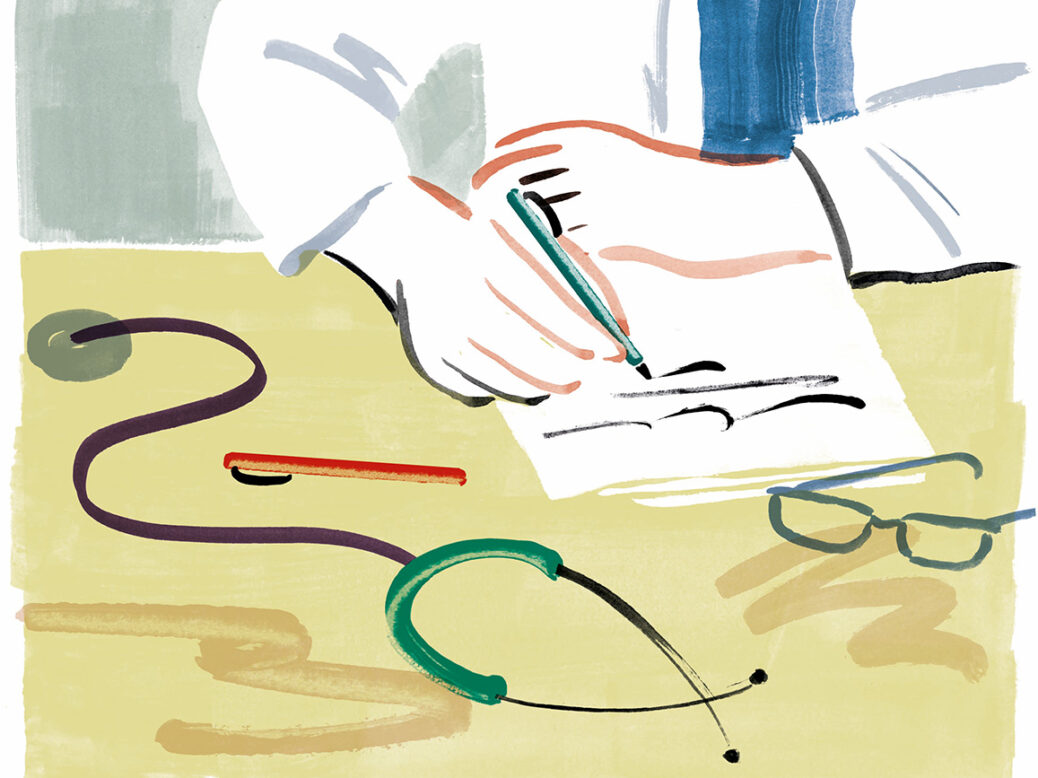
After Sajid Javid’s visit to King’s College Hospital in London on 7 January, social media was flooded with posts from NHS staff. Doctors and nurses rushed to proclaim their Covid vaccination status (invariably double-jabbed and boosted) and counter the comments made by the consultant anaesthetist Dr Steve James.
The YouTube clip of the encounter has had more than 2.5 million views at time of writing. The Health Secretary asks the assembled hospital staff what they think of his policy to make vaccination mandatory for all front-line healthcare workers from 1 April. There is a long silence with several staff making awkward eye contact with each other over the tops of their masks before James is heard to say off camera, “I’m not happy with that.” The consultant says he has been working on a Covid ICU throughout the pandemic, has gained some degree of immunity from having had coronavirus in the past, doesn’t want to be vaccinated and stands to lose his job in a couple of months’ time as a result.
James’s attempt to rationalise his position by citing scientific evidence – which he claimed “isn’t strong enough” to justify making immunisation compulsory – was misguided. He presented only part of the picture and got some of his figures (on transmission of Covid in vaccinated individuals) wrong, too. His comments were seized upon by the anti-vaxx movement as supporting their vehement scepticism, and excited an equal and opposite reaction from the wider medical community. Neither side was right. James was trying to argue a very different point: that he disagrees with compelling healthcare workers to get jabbed.
[see also: Punitive healthcare restriction for the unvaccinated is a slippery slope]
Vaccine uptake among doctors is at least 90 per cent. Some of the unvaccinated may be exempt, but that still means as many as one in ten scientifically literate medics have not yet taken up immunisation. We don’t know the full reasons why Steve James doesn’t want to be vaccinated; but we can be sure that his reasons will feel entirely rational and compelling to him – and that will be true for every other vaccine-hesitant person. They won’t be explicable in terms of the scientific evidence as currently understood, but that isn’t the point. Humans often incorporate rationality into their decision-making but there are always other influences that, at certain times, create countervailing forces that weaken or even overturn rationality entirely.
Those who are pro-vaccination can be just as partial as James was with the scientific evidence. While immunisation does reduce the chance of healthcare workers transmitting Covid to patients, it is only a modest effect. Vaccination does not dispense with the need for the full range of infection-control measures.
Of course, patients should expect to have the risks of acquiring Covid in a healthcare facility minimised. Equally, though, the government is willing to make trade-offs here when it suits. In general practice we have experienced huge political pressure to increase face-to-face consultations, driving up Covid transmission between patients in our waiting rooms. And now self-isolation conditions are being pared back for staff with a proven infection, meaning some will inevitably bring Covid into work when they return.
In such equivocal circumstances, it generates huge ill-feeling when a government compels individuals to be jabbed against strongly held beliefs, or deprives them of their careers should they refuse. Coercion and discrimination – whether against doctors, nurses, or indeed tennis players – feeds anti-vaxx paranoia, polarising the discussion and making it less likely that some hesitant people might yet be amenable to rational persuasion. Furthermore, in healthcare, our entire culture is founded on free and informed consent to all medical interventions. Forcing vaccination on colleagues feels ethically deeply uncomfortable.
I am pro-immunisation and fully jabbed. That long silence and awkward eye contact among staff at King’s College when Javid asked his question suggests there are others who share my disquiet. This mandatory vaccination policy is wrong – both morally and in its ultimate real-world consequences.
[see also: Vaccine mandates won’t solve our anti-vaxxer problem]
This article appears in the 19 Jan 2022 issue of the New Statesman, The end of the party





